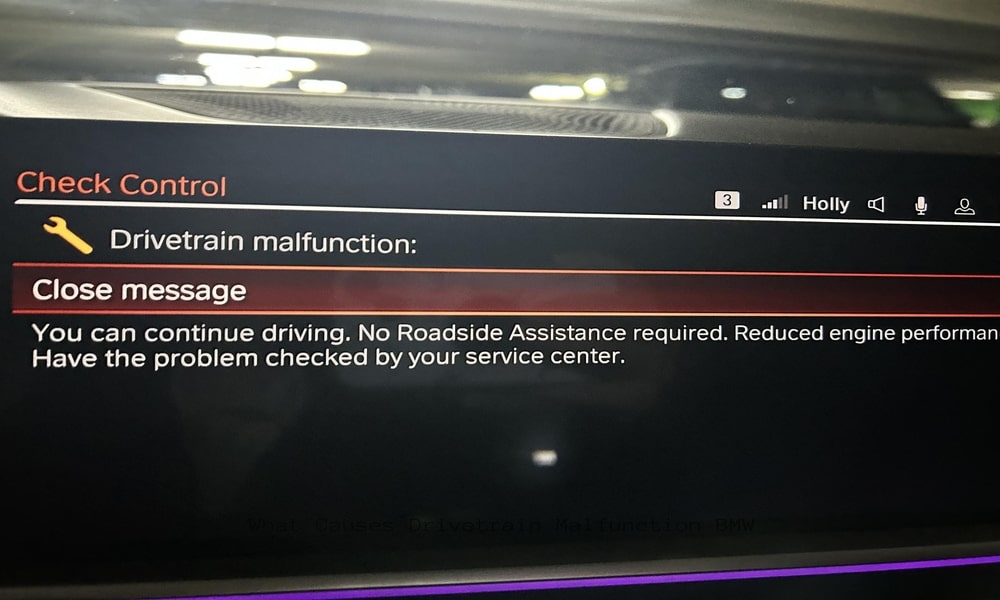BMW vehicles may be known for their innovative design and outstanding performance, however, just as with any other complex machine, they have issues. BMW users are warned by the “Drivetrain Malfunctions” warning. To help you more effectively manage the issue, this article explores what causes drivetrain malfunction BMW, its symptoms, and solutions.
What is a Drivetrain Malfunction BMW?
BMW’s Drivetrain is based on a variety of components, including an engine, transmissions, drive-shafts and axles. All these work together as a unit to transfer power to the wheel. The power transfer can be disrupted by any malfunction of this system, impacting the vehicle’s safety and performance.
If you see a “Drivetrain Malfunction BMW”, it means the onboard computers has identified a fault in this system. From a minor error in software to a mechanical failure that needs immediate attention, this could include a wide range of issues. Most commonly, this problem affects the engine’s performance, transmission, and overall driving.
Key points
- It isn’t a particular error. Instead, it is a blanket warning to alert you of multiple potential problems.
- The early diagnosis of damage is essential to preventing further components from being damaged.
Causes of Drivetrain Malfunction BMW
1. Unexpected engine failures
The combustion process can fail in any one of more than two cylinders. This may result in loss of performance and efficiency, which can lead to drivetrain instability.
Common causes for Engine Misfires:
- Spark plugs, ignition coils and worn spark plugs.
- The fuel is contaminated, or the octane rating has been incorrectly set.
- You may have vacuum leaks, or an insufficient air intake.
2. Transmission issues
The transmission is a vital part of the vehicle’s drivetrain. If it fails, you may experience variable transmission shifts, power losses, and even stalling.
Possible transmission issues:
- Transmission fluid degraded or low quality
- Damaged components of gear.
- Faults electrical in the transmission unit.
3. Faulty sensors
BMWs use a variety of sensors that ensures smooth operation. The system can send the wrong data to the ECU if certain sensors are malfunctioning, for example the Mass Air Flow(MAF), sensor or crankshaft-position sensor.
4. Fuel supply problems
The inefficiency of the drivetrain is caused by an inadequate fuel supply.
Some of the issues include:
- Filled fuel injectors.
- It is possible that your fuel pump has failed or become weak.
- Fuel filter blockage
Symptoms and warning signs
Avoiding costly repairs is possible by early detection. There are some symptoms that indicate causes drivetrain malfunction BMW.
1. Reduced engine power
A car’s power may be reduced to safeguard its parts when it enters a “limp-mode”. Your car’s acceleration will slow down and its responsiveness may be reduced.
2. Experience a jerking sensation or shuddering
Sudden jerkings, vibrations while shifting gears, or when driving fast are clear signs of drivetrain troubles. These movements may indicate an engine malfunction or transmission issue.
3. Signal lights
There may be other dashboard warnings as well, including the check-engine light. They are sometimes accompanied by Diagnostic Trouble Codes (DTCs), for more detailed analysis.
Diagnostic steps
The cause of the Malfunction BMW must be determined. You can do this:
1. Reading error codes
These codes can be read with an OBD-II scanner or BMW-specific tools such as ISTA/D. These codes reveal the source of the Malfunction BMW. Examples include engine misfires like P0300, or transmission faults.
2. Physical inspection
Check components, such as sparkplugs, belts, hoses, for obvious wear and tear. The drivetrain can have problems due to fluid leaks or damaged wires.
3. Using diagnostic tools
Advanced diagnostic systems monitor the vehicle in real time and can detect anomalies, like low fuel pressure or irregular sensor readings.
Immediate actions to take
Take immediate action when you notice a warning that your drivetrain is malfunctioning.
- Safely Pull Over: If you notice severe symptoms in your car, like vibrations or reduced power output, pull over to a safe place.
- Restart your Car: Starting the engine after turning it off can sometimes temporarily fix an error.
- Driving Limits: Try to limit the distance you drive or your speed until an issue has been resolved. A prolonged driving period can worsen any damage.
Repair and maintenance
The repair of a malfunctioning drivetrain often requires specialized knowledge, however regular maintenance prevents many problems.
1. Professional repairs
Repairs will vary based on what the problem is. Common fixes include
- It is essential to change worn out ignition coils (spark plugs), sensors or spark plugs.
- Repairing or rebuilding transmissions.
- Clogged fuel injectors can be replaced or cleaned.
2. Simple maintenance guides
- Change Fluids Frequently: Keep coolant, engine oil, and transmission fluid at optimal amounts.
- Inspect the Components. Look out for any wear or damage on belts.
- Upgrade your BMW software.
Resetting the Drivetrain Malfunction BMW warning
Even after repairs the warning message could not be automatically cleared. Reset it using the following steps.
- Use diagnostic tools: Plug a BMW scanner into the ECU to gain access.
- Clear Codes: Navigate in the section of drivetrain and delete error codes stored there.
- Do a Test Drive: Make sure that you drive the car and check to see if there is a problem.
Warranty and repair costs
Plan your budget by understanding the costs of repair and warranty coverage.
1. Average repair cost
- Spark Plug Replace: 150-$300
- Transmission Overhaul: $2,000-$5,000
- Replacement Sensor: $200 – $500
2. BMW warranty coverage
The warranty may cover drivetrain repairs. The cost of repairs can be reduced by using extended warranties and service agreements.
Is the Drivetrain Malfunction BMW serious?
The drivetrain is indeed a very serious problem. Ignoring this problem could lead to other more serious issues such as:
- Transmission or engine damage permanent
- The fuel consumption and performance of the vehicle will decrease.
- There are safety concerns when power suddenly goes out.
BMWs can last up to 10 years if they are maintained properly.
Conclusion
BMWs’ drivetrains can suffer minor malfunctions or serious mechanical failures. What causes drivetrain malfunction BMW? The problem can be addressed earlier than it becomes a major problem by accepting its causes, recognizing the symptoms and using the right diagnostic tools. For your BMW to run efficiently, you require ordinary maintenance.





